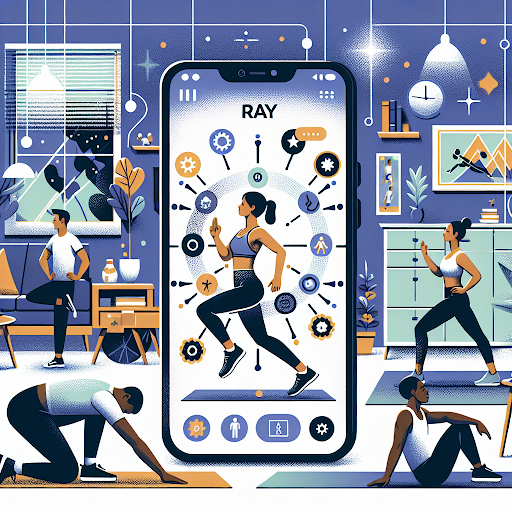Ray: An AI Trainer That Actually Watches You
The AI Personal Trainer in Your Pocket: How Ray is Revolutionizing Fitness for Busy People
Remember that January when you signed up for a gym membership with the best intentions, only to find yourself making excuses by February? You're not alone. The fitness industry has long struggled with a fundamental problem: most people know they should exercise, but maintaining consistency feels impossible without proper guidance and accountability. Enter Ray, an AI-powered fitness app that's reimagining what personal training looks like in the digital age.
The $150 Billion Problem
The global fitness industry is worth over $150 billion, yet 80% of people who join gyms quit within five months. The reasons are predictable: lack of time, intimidation, not knowing what to do, and perhaps most critically—no accountability. Traditional personal trainers solve these problems brilliantly, but at $50-150 per session, they're a luxury most can't afford. This is where Ray's story begins.
Your AI Trainer, Watching and Learning
When you first open Ray, you're not greeted with a generic workout video or a one-size-fits-all program. Instead, an AI trainer begins a conversation with you, learning about your goals, physical limitations, what equipment you have access to, and how much time you can realistically commit. It's surprisingly human—because it's designed to be.
But here's where things get interesting. Using computer vision technology, Ray observes your movements across 35 different body points as you exercise. Think of it as having a trainer's watchful eye, ensuring your squat form is correct or that you're not straining your neck during planks. The app doesn't just show you what to do; it watches how you do it and provides real-time corrections.
As you progress, Ray adapts. Struggled with those push-ups last week? Ray remembers and adjusts. Crushed your workout? Get ready for a new challenge. This dynamic adjustment isn't based on pre-programmed progressions—it's AI learning your unique fitness journey.
The Science of Staying Motivated
What makes Ray particularly fascinating is its approach to the psychology of fitness. Research consistently shows that people who work with personal trainers not only achieve better results with lower injury rates but also stick with their programs longer. The secret isn't just expertise—it's accountability.
Ray mimics this accountability through follow-up text messages, checking how your session went and helping you schedule your next workout. It's a small touch that makes a big difference. When your "trainer" texts to ask why you missed yesterday's session, suddenly that couch doesn't look as inviting.
The app is built on what cofounder Colin Raney calls "the right behavioral loop." It's not about having the most exercises or the fanciest interface—it's about creating a system that naturally encourages you to show up, day after day.
The Technology Under the Hood
Unlike many fitness apps that have simply bolted AI onto existing platforms, Ray was built from the ground up with artificial intelligence at its core. The app leverages:
- Natural Language Processing for conversational interactions that feel genuinely helpful rather than robotic
- Computer Vision to analyze your form and movement patterns in real-time
- Machine Learning Algorithms that continuously refine your workout plans based on your performance history and preferences
Perhaps the most intriguing development on the horizon? Grunt recognition. Yes, you read that correctly. Ray's developers are working on technology that can assess how hard you're working based on the sounds you make during exercise. It sounds like science fiction, but it's another step toward replicating the nuanced observations a human trainer makes.
Who Is Ray Really For?
Ray isn't trying to replace the experience of working with an elite personal trainer for competitive athletes. Instead, it's designed for the millions of busy professionals, parents, and everyday people who want to get healthier but feel overwhelmed by traditional fitness options.
If you've ever felt intimidated walking into a gym, unsure whether you're doing exercises correctly, or simply wished you had someone to guide you through a workout at 6 AM in your living room, Ray might be exactly what you've been waiting for.
The Future of Fitness?
Currently free for early adopters (though a monthly subscription model is coming), Ray represents a broader shift in how we think about fitness technology. We're moving beyond static workout videos and generic training plans toward truly personalized, adaptive experiences that learn and grow with us.
The implications extend beyond individual fitness. If AI can democratize access to quality personal training, what happens to public health outcomes? Could we see a future where personalized fitness coaching is as accessible as a smartphone app for everyone, regardless of income level?
Your Move
As Ray and similar technologies evolve, we're standing at an interesting crossroads. The barriers to quality fitness instruction are crumbling, replaced by AI that can see, learn, and adapt to our individual needs. The technology is here. The question now is: what's stopping you from starting?
Have you tried AI-powered fitness apps? What would it take for you to trust an AI trainer as much as a human one? Share your thoughts below—I'd love to hear about your experiences with fitness technology and what you think the future holds.
---
Ready to explore Ray? Early access is currently free, making this the perfect time to see if an AI personal trainer is right for you.
What's your biggest challenge when it comes to maintaining a consistent fitness routine? Let's discuss in the comments below.




